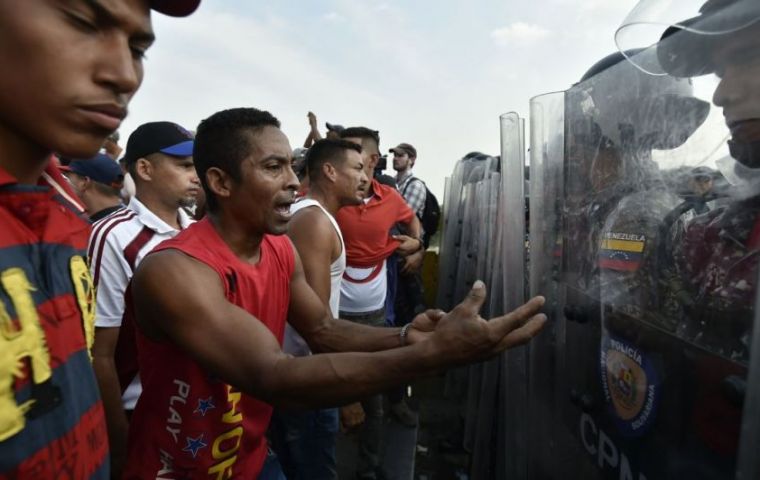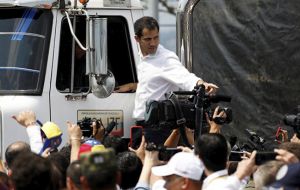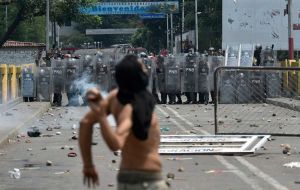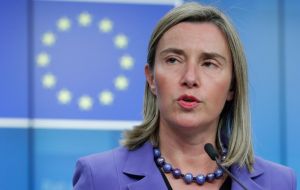MercoPress. South Atlantic News Agency
Humanitarian aid to Venezuela clash: first round for Maduro, but defeat to the world's eyes
 At least four people died in clashes between civilians and troops and armed groups, “colectivos” loyal to Mr Maduro, including a 14-year-old boy. (AFP)
At least four people died in clashes between civilians and troops and armed groups, “colectivos” loyal to Mr Maduro, including a 14-year-old boy. (AFP)  Mr Guaidó marshaled volunteers to collect and transport the aid from Brazil and Colombia but the efforts set off fierce border clashes with soldiers and colectivos
Mr Guaidó marshaled volunteers to collect and transport the aid from Brazil and Colombia but the efforts set off fierce border clashes with soldiers and colectivos  Guaidó had pledged that the aid would come in to the country on Saturday but in response Maduro partly closed borders citing threats to security and sovereignty.
Guaidó had pledged that the aid would come in to the country on Saturday but in response Maduro partly closed borders citing threats to security and sovereignty.  On Sunday EU joined the condemnation. “We reject the use of irregular armed groups to intimidate civilians and lawmakers who have mobilized to distribute aid”
On Sunday EU joined the condemnation. “We reject the use of irregular armed groups to intimidate civilians and lawmakers who have mobilized to distribute aid” Venezuelan opposition leader Juan Guaidó has called on other nations to consider “all measures” to oust President Nicolas Maduro. International pressure is building on Mr Maduro after opposition-led efforts to bring aid into Venezuela descended into deadly violence on Saturday.
At least four people died in clashes between civilians and troops and armed groups, “colectivos” loyal to Mr Maduro, including a 14-year-old boy.
The president has blocked land and sea aid deliveries from entering Venezuela.
Mr Guaidó marshaled volunteers to collect and transport the aid from Brazil and Colombia but the efforts set off fierce border clashes with soldiers and colectivos, that opened fire using a mixture of live ammunition and rubber bullets.
The US Secretary of State, Mike Pompeo, condemned the violence by “Maduro's thugs” and said the US was prepared to “take action”. President Donald Trump said that Washington had not ruled out an armed response.
Disputed President Nicolas Maduro announced in a speech to his supporters on Saturday that he is cutting off diplomatic ties with Colombia. Colombian president Ivan Duque said Bogota's ambassador and consuls have 24 hours to leave Venezuela.
On Sunday the European Union joined the condemnation. “We reject the use of irregular armed groups to intimidate civilians and lawmakers who have mobilized to distribute aid,” said EU foreign policy chief Federica Mogherini.
Guaidó, 35, last month (23 January) declared himself interim president and has since been recognized as interim leader by more than 50 countries. He has cited a constitutional provision that passes power to the leader of Venezuela's parliament if the president is “absent”. Mr Guaidó argues that alleged irregularities with the nation's 2018 election render Mr Maduro's leadership illegitimate.
Mr Guaidó has announced his attention to participate in a meeting of the Lima Group mostly Latin American countries in Bogota, Colombia on Monday, despite being under a travel ban imposed by Mr Maduro. US Vice President Mike Pence will represent Washington at the meeting.
Led by Mr Guaidó, Venezuela's opposition had intended to peacefully bring aid trucks over the borders with Brazil and Colombia, and by sea from Caribbean islands. Soaring inflation has left many Venezuelans unable to afford basic items such as food and medicine.
Mr Guaidó had pledged that the aid would come in to the country on Saturday. In response, Mr Maduro partly closed the country's borders, citing threats to security and sovereignty.
On Saturday, Venezuelans civilians attempted to cross in order to get to the stores of food and medicine, but the attempt quickly descended into bloody violence. Protesters clashed with security forces loyal to the president along Venezuela's southern border with Brazil and western border with Colombia.
At least four people including a 14-year-old boy were killed, rights groups said, and dozens were injured as Venezuelan troops, supported by colectivos (civilians armed by the Maduro regime) fired a mixture of tear gas, rubber bullets and live ammunition.
Some Venezuelan soldiers on Saturday attempted to defect at the border with Colombia. Mr Guaidó visited the Tienditas bridge on the Colombian side of the border and promised the defectors amnesty if they joined the “right side of history”.
At least 60 soldiers had defected by late Saturday, according to Colombia's migration service, but most of the military appeared to still be loyal to Mr Maduro.
Video footage showed Venezuelan soldiers crashing their armored vehicles into the border with Colombia in order to defect. Another video posted on social media appeared to show four soldiers publicly denouncing the president and announcing their support for Guadio “We are fathers and sons, we have had enough of so much uncertainty and injustice,” the soldiers said.
At about 19:00 local time (23:00 GMT) on Saturday, Colombia's government estimated the number of injured at border crossings to be about 300. Journalists at the scene reported severe injuries among protesters, including several who appeared to have lost their eyes.
Amnesty International described the use of live ammunition against protesters as a serious human rights violation and a crime under international law.
President Maduro continues to oppose Mr Guaidó's claim to the presidency and has ignored international calls to hold new elections. He has accused Mr Guaidó of being a “puppet”, an “American pawn”, a “clown” and an “imperialist beggar”.
As protests got under way at Venezuela's borders, Mr Maduro staged a rally in Caracas. “Take your hands off Venezuela, Donald Trump,” he told a cheering crowd, accusing the US president of using the aid as a means to invade the country.
Despite dozens of countries backing the opposition leader, Mr Maduro maintains the support of key economic allies including Cuba, Russia, China, Turkey and Iran. The US is leading the international effort to pressure him, and has implemented a raft of financial sanctions against his government.




Top Comments
Disclaimer & comment rulesCommenting for this story is now closed.
If you have a Facebook account, become a fan and comment on our Facebook Page!